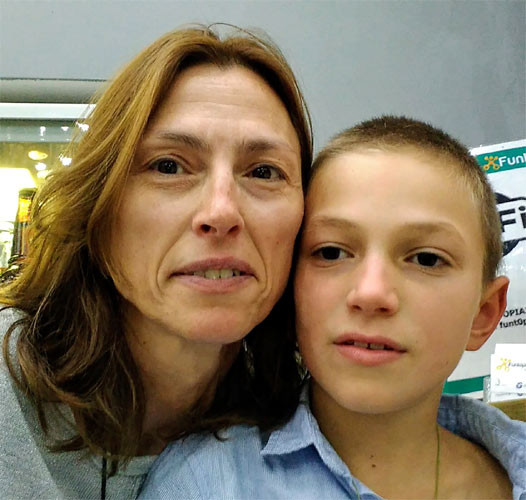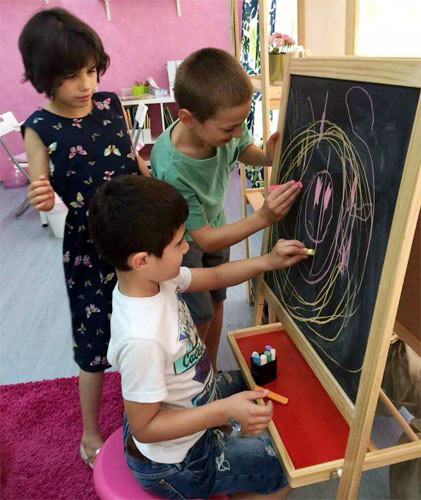A progressive school for children with autism would open doors in Sofia. "It is important to have a comprehensive approach when working with children with autism," Hristina Babalova, Chair of the “Education Equality-Autism” Association, says.
The number of children diagnosed with autism has been constantly growing. There are no accurate statistics in Bulgaria, but according to the World Health Organization 1 out of 160 children has autism spectrum disorder *. These children need teachers and environment helping them overcome deficits and realize their potential.
 “Pupils with autism now have two options: the child could study in an ordinary class, as it is most often recommended that the parent becomes an assistant as the teachers cannot fully meet the needs of this child. The other form of education is individual but in this case the child has no contact with classmates. Integration is very important for these children,” Christina Babalova, mother of a child with autism and head of the Education Equality Association says.
“Pupils with autism now have two options: the child could study in an ordinary class, as it is most often recommended that the parent becomes an assistant as the teachers cannot fully meet the needs of this child. The other form of education is individual but in this case the child has no contact with classmates. Integration is very important for these children,” Christina Babalova, mother of a child with autism and head of the Education Equality Association says.
Parents, teachers and pupils face various problems as one of the biggest issues is lack of training for working with children with autism among a large part of pedagogical staff. Hristina Babalova told us more:
"In a class of 20 children, if there was a child with autism, the teacher simply cannot use time effectively. If the child felt discomfort the assistant takes him or her out, so that the class is not interrupted. There is insufficient work with specialists provided - a speech therapist is provided for half an hour a week to a child with non-verbal autism, i.e. a child who does not speak."
Complementary specialists also work with children with special needs, as the number of specialists can reach 6-7 people, which is also stressful for the child. “The number of specialists working with my child is at least 25 people as one is not acquainted with the work of the other,” Hristina Babalova says.
 It is important to have a comprehensive approach to work with children with autism. Creating a new school where all the specialized activities would be carried out in one place is necessary. Besides the link between specialists, another serious problem would be solved – extensive commuting. Currently, children with special needs spend many hours traveling from one place to another, instead of resting, being engaged in sports or talking to peers. Therefore, parents hope a specialized group for children with autism will be opened in a new school:
It is important to have a comprehensive approach to work with children with autism. Creating a new school where all the specialized activities would be carried out in one place is necessary. Besides the link between specialists, another serious problem would be solved – extensive commuting. Currently, children with special needs spend many hours traveling from one place to another, instead of resting, being engaged in sports or talking to peers. Therefore, parents hope a specialized group for children with autism will be opened in a new school:
“This is a joint project with Progressive Primary School,” says the head of Association “Education Equality – Autism”. “They gave us a helping hand, especially in bringing the issue of education of children with autism to the social agenda. We now have to train specialists who are ready and willing to work with children with autism using new and proven methods.”
It is envisaged that an innovative methodology will be used and over the years it will be adjusted in order to fully meet the needs of Bulgarian children.
In addition to education, the program also focuses on behavior. In order to provide complex care and comprehensive work with children, school classes are planned to take place in the morning, while in the afternoon children would be engaged in sporting activities, art and music therapy.
“We hope more people would recognize this issue and start building a community of associations like ours. We want to help institutions in staff training, so there are more experts, specialized in working with children with autism.”
English: Alexander Markov
Photos: private libraryThe 33rd Bulgarian polar expedition is heading to Antarctica to continue its scientific research in cooperation with scientists from different countries. For the first time, travelers from two Balkan countries - Greece and Montenegro, as well as from..
The program of the Orthodox Book Week offers meetings with authors, publishers and translators of Orthodox books from the last few years. The event is held until November 10 at the ''St. Procopius of Varna'' Church, with meetings taking place every..
The "Kabiyuk" horse breeding farm in the village of Konyovets is the oldest stud farm in Bulgaria, founded in 1864 by Midhat Pasha, the governor of the vilayet of Ruse, to produce horses for the Turkish army. The farm existed until the Russo-Turkish War..
According to the Annual Report on the Health Status of Bulgarian Citizens for 2023, t he main cause of death in Bulgaria is diseases of the..
At the Bulgarian Embassy in London, Prof. Bettany Hughes presented excerpts from the new BBC series - Wonders of Bulgaria. Prof. Bettany..
Over 3.5 million Ukrainians have arrived in or passed through Bulgaria since the beginning of the war. Nearly 200,000 people have found temporary..

+359 2 9336 661
